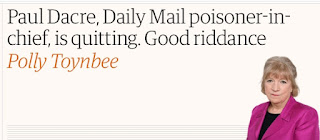Polly Toynbee in the Guardian on Paul Dacre: "Asked for the winning formula of his Daily Mail, Lord Northcliffe replied: 'I give my readers a daily hate.' No one has kept that flame burning more brightly than Paul Dacre, poisoner of the national psyche, bully-in-chief, whose iron whim has terrified prime ministers for a quarter of a century...Like all bullies he targets underdogs, imposing on the country racism, homophobia and philistinism, and shunning complexity and evidence."
Carole Cadwalladr, after the Sunday Times and the Observer both splashed on Russian links with Leave campaigners amid claims story was given to the Sunday Times to 'spoil' the Observer scoop, quoted by Press Gazette: “Journalists jealously guard their scoops. However in this instance I thought if this is what it took to get this information out in the public domain, it also had to go in the Sunday Times, I was delighted, really pleased. The objective was to get it into the public domain. Whether that’s in the Observer or the Sunday Times I don’t care that much.”
Les Hinton in the Mail on Sunday on Norman Scott: "I found myself appointed Scott’s ‘minder’ when my newspaper, The Sun, did a deal with him for exclusive interviews. In my media career, I’ve spent time with presidents, prime ministers, monarchs and princes, the Sex Pistols, a couple of Rolling Stones, and a few billionaires but I’ll never forget my days in the depths of Devon with Norman Scott. It was a bleak period for the media — hoodwinked into believing Scott was a freak and a liar.When the Sunday Mirror received a dossier of powerful evidence to support Scott’s claim, the editor sent it to Thorpe and didn’t publish a word. Even in 1976, when the Thorpe-Scott scandal blew up into a national story, the Sunday Times published a front-page lead, headlined: The lies of Norman Scott."
Investigative journalist Seymour Hersh, interviewed in the Daily Telegraph [£]: "My job is to walk into an editor's office, throw a dead rat full of lice on their desk and say 'this what I want to do for the next three months, it's going to cost you a lot of money, you are going to get sued, you are going to get threats, and you are going to lose customers - but let's go at it!'"
The Committee to Protect Journalists' North America program coordinator Alexandra Ellerbeck in a statement on the seizure of phone and email records from New York Times reporter Ali Watkins by the United States Justice Department: "In order to perform their public accountability function, journalists must be able to protect their confidential sources. Efforts by government that undermine this ability therefore represent a fundamental threat to press freedom. This is why we believe that the government's seizure of Ali Watkins's data sets a dangerous precedent. We fear it could be an opening salvo in an ongoing battle over reporters' ability to protect their sources."
Steve Bird, father of chapel at the Financial Times, backing an NUJ campaign for journalists to take a proper lunch break outside their newsrooms on the longest day of the year next Thursday (June 21): "NUJ activists should follow the example set in Leeds to organise and promote a picnic outside of the office on the longest day of the year. Hopefully, this will provide an extra reason to get out of the office and will draw attention to the central issues of work stress and long hours.
Findings of a study into decline of local press in the US, reported by the Guardian: "When a local newspaper closes, the cost of government increases. That’s the conclusion of new survey from Notre Dame’s Mendoza College of Business, which draws a direct line between loss of the watchful eyes of local newspapers and a decline in government efficiency."
Dominic Ponsford in Press Gazette: "Reading the Daily Mail is for me a little like eating foie gras. There is some guilt about the suffering that has gone into its production, but you cannot deny that it somehow adds to the richness of the flavour."
David Yelland @davidyelland on Twitter: "Putting remainer Geordie Greig in at the Daily Mail isn’t just big news it is revolutionary. This changes everything for Brexit and the consequences could be historic."
Paul Dacre in The Spectator [£]: “Support for Brexit is in the DNA of both the Daily Mail and, more pertinently, its readers. Any move to reverse this would be editorial and commercial suicide.”
Roy Greenslade in the Guardian: "At times, such as the front-page attacks on judges and Gina Miller, Dacre appeared to have lost all reason. How, one was given to saying, can Rothermere live with this stuff? Why is he keeping him in the chair? Now it is all too late. Greig will certainly pursue a less strident line, but the damage has been done. Dacre, the grand old Duke of York, marched his army up to the top of the Brexit hill, and they are still there, firing Mail-manufactured missiles at the so-called Remoaners. Greig cannot march them down again. He cannot turn back the clock. Although Brexit will be seen as Dacre’s legacy, see it instead as Rothermere’s. The last of Britain’s press barons has let his country down."
Steve Bird, father of chapel at the Financial Times, backing an NUJ campaign for journalists to take a proper lunch break outside their newsrooms on the longest day of the year next Thursday (June 21): "NUJ activists should follow the example set in Leeds to organise and promote a picnic outside of the office on the longest day of the year. Hopefully, this will provide an extra reason to get out of the office and will draw attention to the central issues of work stress and long hours.
Findings of a study into decline of local press in the US, reported by the Guardian: "When a local newspaper closes, the cost of government increases. That’s the conclusion of new survey from Notre Dame’s Mendoza College of Business, which draws a direct line between loss of the watchful eyes of local newspapers and a decline in government efficiency."
Dominic Ponsford in Press Gazette: "Reading the Daily Mail is for me a little like eating foie gras. There is some guilt about the suffering that has gone into its production, but you cannot deny that it somehow adds to the richness of the flavour."
David Yelland @davidyelland on Twitter: "Putting remainer Geordie Greig in at the Daily Mail isn’t just big news it is revolutionary. This changes everything for Brexit and the consequences could be historic."
Paul Dacre in The Spectator [£]: “Support for Brexit is in the DNA of both the Daily Mail and, more pertinently, its readers. Any move to reverse this would be editorial and commercial suicide.”
Roy Greenslade in the Guardian: "At times, such as the front-page attacks on judges and Gina Miller, Dacre appeared to have lost all reason. How, one was given to saying, can Rothermere live with this stuff? Why is he keeping him in the chair? Now it is all too late. Greig will certainly pursue a less strident line, but the damage has been done. Dacre, the grand old Duke of York, marched his army up to the top of the Brexit hill, and they are still there, firing Mail-manufactured missiles at the so-called Remoaners. Greig cannot march them down again. He cannot turn back the clock. Although Brexit will be seen as Dacre’s legacy, see it instead as Rothermere’s. The last of Britain’s press barons has let his country down."
Matt Kelly @mk1969 on Twitter: "Logistics of the Mail changes make it seem likely that Dacre was pushed. No way he’d be happy with Greig as successor and no way would he be happy with him reporting to Rothermere He’s been totally bypassed in 24 hours. Some legacy!...and as @campbellclaret once told me; there’s nothing as ex as an ex-editor."
[£]=paywall
[£]=paywall














No comments:
Post a Comment